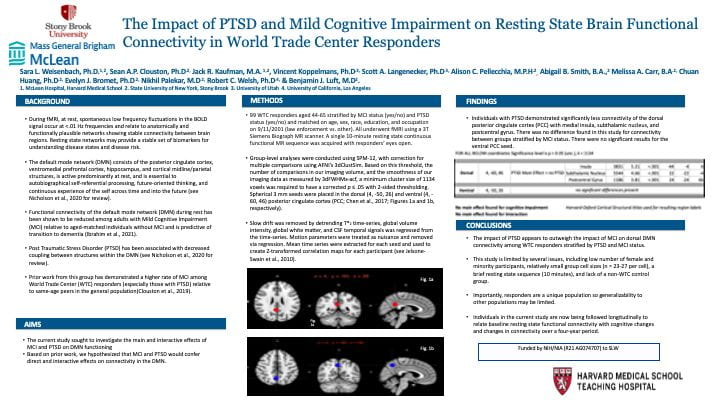Scientific Abstract
Background: Functional connectivity of the default mode network (DMN) during rest has been shown to be different among adults with Mild Cognitive Impairment (MCI) relative to aged-matched individuals without MCI and is predictive of transition to dementia. Post-traumatic stress disorder (PTSD) is also associated with aberrant connectivity of the DMN. Prior work from this group has demonstrated a higher rate of MCI and PTSD among World Trade Center (WTC) responders relative to the general population. The current study sought to investigate the main and interactive effects of MCI and PTSD on DMN functioning. Based on prior work, we hypothesized that MCI, but not PTSD, would predict aberrant connectivity in the DMN.
Methods: 99 WTC responders aged 44-65 stratified by MCI and PTSD status and matched for age, sex, race, and educational attainment, and occupation underwent fMRI using a 3T Siemens Biograph MR scanner. A single 10-minute continuous functional MR sequence was acquired while participants were at rest with their eyes open. Group-level analyses were conducted using SPM-12, with correction for multiple comparisons using AFNI’s 3dClustSim. Spherical 3 mm seeds were placed in the dorsal (4, -50, 26) and ventral (4, -60, 46) posterior cingulate cortex (PCC).
Results: Individuals with PTSD demonstrated significantly less connectivity of the dorsal PCC with medial insula (T = 5.21), subthalamic nucleus (T = 4.66), and postcentral gyrus (T = 3.81). There was no difference found in this study for connectivity between groups stratified by MCI status. There were no significant results for the ventral PCC seed.
Conclusions: Contrary to hypotheses that were driven by a study of cortical thickness in WTC responders, the impact of PTSD appears to outweigh the impact of MCI on dorsal DMN connectivity among WTC responders stratified by PTSD and MCI status.
Search posters

